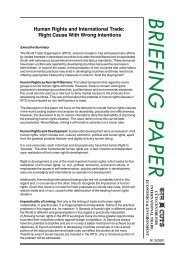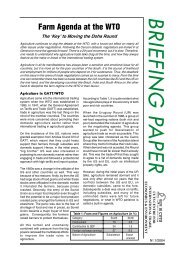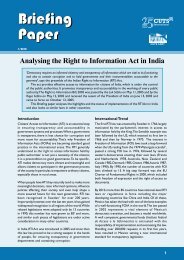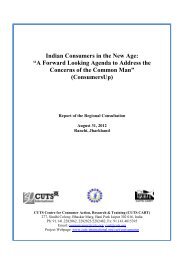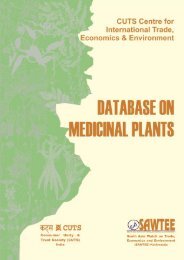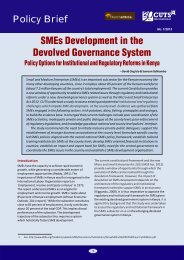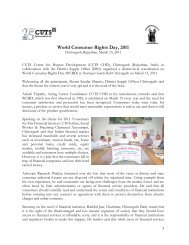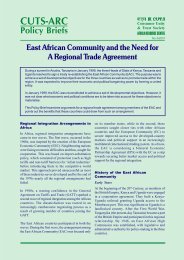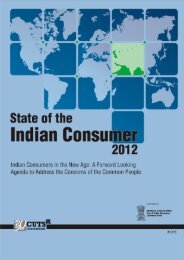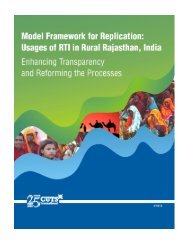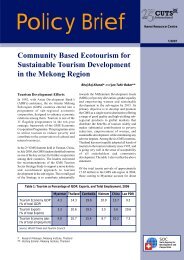Final Report - World Trade Organization
Final Report - World Trade Organization
Final Report - World Trade Organization
You also want an ePaper? Increase the reach of your titles
YUMPU automatically turns print PDFs into web optimized ePapers that Google loves.
2. International donors could finance training<br />
and advocacy programmes. This would alleviate<br />
the strained budgets of the competition authorities<br />
in many of the 7-Up countries without threatening<br />
their independence.<br />
As stated, the South African competition authorities<br />
are the exception in many cases. They are<br />
substantially better equipped in all regards. Their<br />
funding seems to be sufficient and at a similar level<br />
with developed countries like Norway. The majority<br />
of their funds are obtained through notification and<br />
process fees from merger cases. The Competition<br />
Commission is therefore also financially quite<br />
independent. This, however, may not work in all the<br />
project countries. Merger activity differs across<br />
countries and may not be very substantial in many<br />
countries, especially small ones, thus notification fees<br />
may not be a viable source of income.<br />
Another possibility for competition authorities to<br />
increase their financial resources while at the same<br />
time making them less dependent on government<br />
funds, would be to grant them a percentage of the<br />
fines imposed on companies that violate the<br />
competition laws. A problem with this is that the<br />
authorities would have a perverse incentive to impose<br />
excessive fines on these companies. This would<br />
diminish their credibility as an independent regulator<br />
and would therefore probably not be the best way to<br />
increase the authorities’ resources.<br />
Nevertheless, most of the competition agencies are<br />
certainly in need of extra financial resources.<br />
Although increased government funding is a<br />
possibility, especially in countries where the<br />
authority’s budget as a percentage of that of the<br />
government is low. In countries like Zambia and<br />
Tanzania where the relative budget is already high,<br />
this may not be desirable in the face of so many<br />
other urgent problems. Foreign donors could,<br />
therefore, play a role in setting up and providing<br />
specific training programmes and finance advocacy<br />
activities to create a competition culture. They could<br />
also provide resources to establish and maintain<br />
libraries and databases. This type of support would<br />
alleviate the authorities’ budgetary problems without<br />
interfering in their ability to make their own decisions<br />
based on their own priorities.<br />
3. Better cooperation and coordination among the<br />
CAs are required, especially to deal with cases<br />
of international dimension.<br />
Apart from staff training programmes, cooperation<br />
with foreign competition authorities is also required<br />
for dealing with cross-border issues. Increasingly, the<br />
competition agencies in the 7-Up countries are faced<br />
with international mergers and anti-competitive<br />
practices. Whether countries have special provisions<br />
for extra-territorial jurisdiction or apply the ‘effects’<br />
doctrine is not important when they have no means<br />
to enforce their decisions. Often the companies<br />
involved are beyond the reach of the competition<br />
agencies, which also causes problems in obtaining<br />
the information necessary to make a decision.<br />
Cooperation with foreign agencies could help in this<br />
regard. A multilateral framework for cooperation will<br />
be quite useful, so that demands for information are<br />
not treated in a partisan manner.<br />
8.4 Scope and Coverage<br />
A full evaluation of having and implementing a<br />
competition law requires an assessment of its<br />
effectiveness. This effectiveness is measured by the<br />
extent to which the objectives of a country’s<br />
competition law and policy are obtained. Objectives<br />
vary from country to country and are influenced by<br />
their specific circumstances and needs.<br />
An evaluation of a competition law and policy’s results<br />
vis-à-vis its objectives is by its very nature difficult,<br />
given the fact that market realities are constantly<br />
changing. In the 7-Up group this difficulty is<br />
enhanced by the fact that most of the countries have<br />
only recently enacted competition legislation, making<br />
it too early to see the full effects of the competition<br />
law and policy. Nevertheless, certain problem areas<br />
and possible solutions can be identified.<br />
1. Competition policy and law should focus on<br />
consumer welfare and efficiency while at the<br />
same time take cognisance of a country’s overall<br />
public policy.<br />
Although consumer welfare and economic efficiency<br />
are generally the core objectives of competition law<br />
and policy, the legislation in the 7-Up countries also<br />
reflects many other development needs. For instance,<br />
the Zambian competition law hopes to encourage<br />
innovation, ensure fair distribution and reduce<br />
unemployment. In Tanzania, merger evaluations must<br />
take account of the impact on employment,<br />
competitiveness in export markets and the ability to<br />
face import competition.<br />
The advancement of social and economic welfare,<br />
the promotion of small and medium-sized enterprises,<br />
Pulling Up Our Socks w 91



